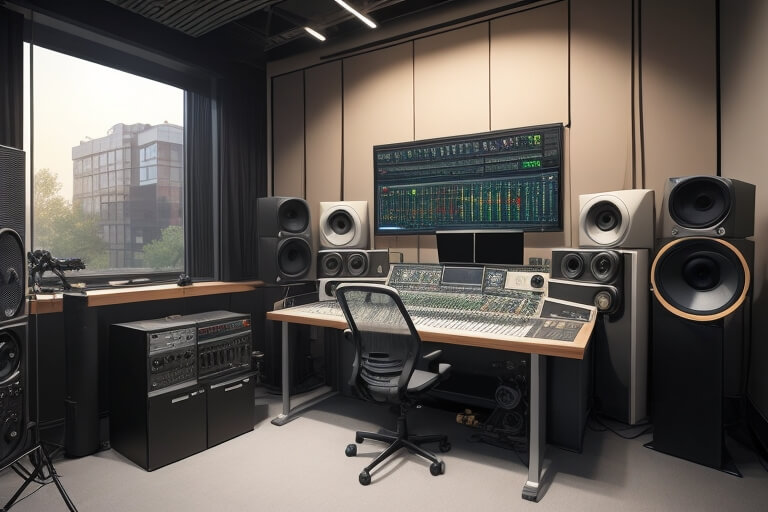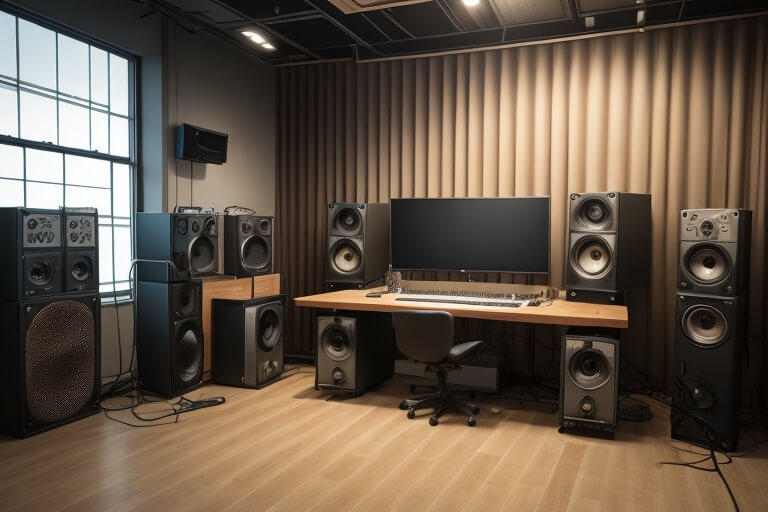
In an era where audiobooks are soaring in popularity, offering a convenient and enjoyable means for audiences to consume content, the quality of sound plays a pivotal role. A crisp, clear, and well-modulated audio can be the difference between a one-time listener and a loyal audience. This comprehensive guide delves into the intricacies of enhancing audiobook sound quality, ensuring an immersive and captivating auditory experience.
Audiobook Sound Quality – Editing Process
Editing and Quality Control:
Editing is not just about eliminating unwanted sounds but also about enhancing the auditory experience. The pacing and inflection are crucial; a well-paced audiobook with varied tones can captivate listeners, making the narrative lively and engaging. The role of an editing engineer extends to ensuring that the narration’s pace and tone align with the content’s emotion and intent.
Editing Techniques
Removing Unwanted Sounds and Enhancing Pacing:
An editing engineer focuses on eliminating pops, clicks, background noise, and other distracting sounds. They also play a crucial role in modulating the pace of the narration and ensuring the inflection is varied and appropriate, making the story come alive for the listeners.
Quality Control
Ensuring Accuracy and Engagement:
QC engineers meticulously review the audiobook, ensuring every detail, including pacing and tone, aligns perfectly with the written manuscript and engages the audience effectively.
Enhancing Audiobook Sound Quality
Recording in a Quiet Location and Audio Enhancement Techniques:
Selecting a quiet recording environment is foundational. However, technological interventions like compression and equalization are instrumental in enhancing clarity and audio balance. Compression ensures consistent sound levels, while equalization balances various sound frequencies, offering listeners a rich and balanced audio experience.
Additional Tips for Optimal Sound Quality
In the journey to create an audiobook that not only tells a compelling story but also delivers an unmatched auditory experience, every detail matters. Beyond the foundational steps of choosing a quiet location and utilizing professional editing techniques, there are additional strategies that can elevate the quality of your audiobook to meet and exceed listeners’ expectations.
Advanced Audio Equipment:
The choice of audio equipment can significantly impact the final output. Investing in a high-quality microphone that captures clear and detailed sound is essential. Microphones with noise-cancellation features and the ability to capture a wide range of frequencies can make a notable difference.
Acoustic Treatment:
The recording environment should be acoustically treated to minimize echo and reverb. Utilizing acoustic panels, bass traps, and diffusers can help in controlling sound reflections within the room. Ensuring that the recorded audio is clear and free from distortions.
Microphone Techniques:
The distance and angle at which the narrator speaks into the microphone can affect the sound quality. Experimenting with different positions and angles can help in achieving a sound that is clear, full-bodied, and free of plosives and sibilance.

Soundproofing:
In addition to choosing a quiet location, adding an extra layer of soundproofing can be beneficial. This can be achieved by using materials that absorb sound. Also prevent it from entering or leaving the recording space, ensuring that external noises do not interfere with the recording.
Professional Audio Editing Software:
Utilizing professional audio editing software can provide a range of tools and features to enhance sound quality. Features like noise reduction, equalization, and compression can be tailored to meet the specific needs of your audiobook. Ensuring each chapter delivers a consistent and high-quality listening experience.
Regular Equipment Maintenance:
Regularly maintaining and checking the audio equipment ensures that it performs optimally. Cleaning and servicing the microphones, cables, and other recording equipment can prevent unexpected issues during the recording process.
Training and Practice for Narrators:
The narrator’s skill is as crucial as the equipment and environment. Training and practice can help narrators master the art of modulating their voices. Also pacing, and tone, ensure that the storytelling is engaging and the pronunciation is clear and accurate.
Feedback and Revisions:
Before finalizing the audiobook, obtaining feedback from a select audience can provide insights into the audio quality. Also the overall listening experience. This feedback can be instrumental in making necessary revisions to ensure that the audiobook meets the highest standards of quality.
Incorporating these additional tips can significantly enhance the sound quality of your audiobook. It ensures that it stands out in the competitive market and delivers an exceptional listening experience to the audience. Every detail, from the choice of equipment to the narrator’s skill and the editing process, contributes to the final quality of the audiobook. Making each step crucial in the journey to create an audiobook that captivates and resonates with listeners.
The Role of Audiobooks Production Companies
Professional Touch:
While DIY methods have their merits, the expertise, high-quality equipment, and advanced audio editing and mastering skills of professional audiobook production companies are unparalleled. They not only ensure technical precision but also bring creative insights to enhance the auditory experience. Their expertise ensures that the audiobook resonates with listeners, offering a captivating and immersive experience that stands out in the crowded marketplace.
Conclusion
The journey to achieving exceptional audiobook sound quality is intricate, combining the art of narration with the science of sound engineering. In the competitive landscape of audiobooks, every detail, from the recording environment to the nuances of editing and mastering, plays a pivotal role. By integrating these comprehensive tips and considering the expertise of professional production services, authors and publishers can ensure that their audiobooks not just reach but resonate with listeners, offering a captivating and immersive experience that leaves a lasting impression.

